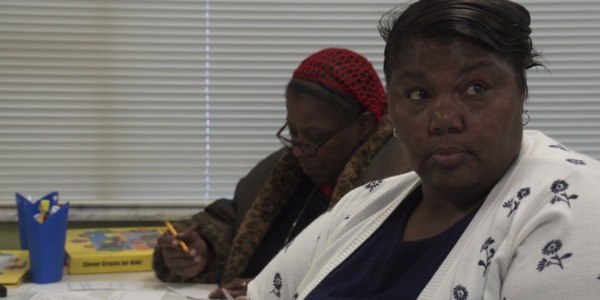The state of education has been thrust back into the national conversation by the appointment of Betsy DeVos as the Secretary of Education. But in the ongoing dialogue about vouchers, charter schools and historically black colleges and universities, one area has been resoundingly overlooked – that of adult education. A potential part of a multi-faceted solution to a host a social issues, returning to school as an adult feels largely stigmatized in a “damned if you do damned if you don’t” kind of scenario.
People who didn’t graduate high school need the diploma to get better jobs as part of a more fulfilling life, but even though they’re largely putting in more effort and commitment than their time in high school, the resulting certification is seen as being worth less than if they had gotten it the first time around.
Enter Andrew Cohn‘s Night School, which takes for its subjects three residents of Indianapolis seeking to correct their past and change their futures by finally getting a high school diploma. The film follows them through the year-long program, and attempts to get a broader perspective on their lives to provide a context for their new endeavor.
Subjects Shine Through
Night School opens with a fat bass line followed by a break beat, intended as shorthand to place the viewer in an “urban” setting. During the intro establishing shots of bus stops and rundown yet active basketbal courts try to further that feeling of place, but the whole thing feels a little on the nose, ending with a man literally crossing train tracks with the glittering lights of downtown behind him, as if to say “this story takes place on the ‘other’ side of the tracks”, which, other than being outright lazy, carries with it connotations of othering and separatization before we even meet our main characters.

That’s not to say that Cohn actively objectifies his subjects, but in the process of chronicling three lives in under 90 minutes, they do end up getting reduced to one single element of their lives outside of the school that is the common thread between them. Greg is trying to come back from a life on the streets to do right by his daughter. Melissa is rediscovering love in her 50s. And Shynika, as a current Arby’s employee, is joining the national Fight for 15 movement to get better wages for fast food employees.
These plot threads are almost entirely removed from the education storyline, so in addition to not fully fleshing its subjects, Night School also at times comes off as significantly unfocused. The film jumps around from subject to subject, trying to balance their school and personal lives in a way that never feels holistic and ultimately waters down the impact of the climax.
But despite the muddied structure of Night School and limited exploration of its subjects and themes, those subjects manage to carry the film enough that it is ultimately a worthwhile experience, so all credit to Cohn on his talent for picking people to follow, even if the execution of documenting them wasn’t ideal.
Greg, Melissa and Shynika don’t hold anything back, always exuding sincerity and passion, another credit to the director, as he must have developed a solid rapport with them to capture such earnestness. Though as subjects they’ve been reduced to base narrative characterizations, those are the aspects of their lives that most clearly demonstrate why their pursuing this second chance and what achieving it would mean to them.
Changing Perceptions
There’s something naturally infantilizing about the concept of adult education, where one voluntarily chooses to return to an institution almost exclusively connoted with childhood. We get to see that play out some as we’re reminded how pointless high school can feel, watching a teacher drones on about cholesterol and lipids. But Night School does a good job in fighting that preconception about adult education, less by showing the effort and determination needed to achieve a delayed high school diploma, but more so in showing the type of character and conviction of a person who’s apt to succeed.
Night School would likely have been better served by just tracking a single subject so that were could have gone deeper into their life, spent more time on the educational side of things, and have a better structured film. But for all of its faults, the film ends up more good than bad, almost entirely on the backs of its captivating and relatable subjects. In selecting Greg, Melissa and Shynika, Cohn hedged his bets and ended up succeeding in telling a largely positive story about American poverty; if you’re not welling up during the film’s final scene I’m not sure I want to know you.
Night School opens at the IFC Center in NYC today, expanding to other US cities in the following weeks. To see when it’ll be playing near you, visit this website.
Does content like this matter to you?
Become a Member and support film journalism. Unlock access to all of Film Inquiry`s great articles. Join a community of like-minded readers who are passionate about cinema - get access to our private members Network, give back to independent filmmakers, and more.